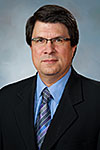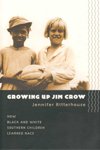Historian looks at children’s experience to understand Jim Crow society
When Jennifer Ritterhouse first started studying segregation and the Jim Crow South, she became interested in how people started changing their thinking during the Civil Rights movement.
“A professor gave me a copy of Sarah Patton Boyle’s autobiography, ‘The Desegregated Heart: A Virginian’s Stand in Time of Transition,’” Ritterhouse said. “Boyle spends a lot of time talking about how she developed and then changed her thinking about segregation. That led me to the question, ‘How do children growing up in these societies learn the rules of engagement dealing with race?’”
That question was the beginning of Ritterhouse’s book, “Growing Up Jim Crow: How Black and White Southern Children Learned Race,” and also will be the topic of her presentation as part of the University of Houston-Victoria’s A.D. Sheffield Symposium on African American History. Ritterhouse will speak at 6 p.m. Feb. 25 in the Alcorn Auditorium of UHV University West, 3007 N. Ben Wilson St. The event is free and open to the public.
“Jennifer Ritterhouse’s examination of children and how they learned to navigate Jim Crow society ties into this year’s symposium theme, ‘Before Brown: Segregated Education in the Crossroads,’” said Jeffrey Di Leo, dean of the UHV School of Arts & Sciences. “It’s an eye-opening opportunity to see how the standards and expectations of a society perpetuate through generations and the amount of strength it takes to break out of those expectations.”
As Ritterhouse, an associate professor of history at George Mason University in Fairfax, Va., studied sources through autobiographies and oral accounts, she noticed that they all shared childhood stories that impacted how they perceived society and how they were supposed to fit in.
“I found that looking at society in relation to children was particularly helpful,” Ritterhouse said. “It’s people’s learning experiences by making mistakes that highlight the rules. Otherwise, historians can miss things when looking at those who already know and follow those rules every day.”
One story that stuck with Ritterhouse was recorded by prominent activist Mary Church Terrell, who grew up in a well-off African American family. One day, when Terrell was about 6 years old, she went on a train trip with her father. When her father went to the smoking car, Terrell was harassed by the ticket taker, who wanted to throw her out of the first-class car.
That incident of a well-dressed, well-behaved young girl facing abuse because of her race was a powerful illustration of how societal standards were maintained, Ritterhouse said. The impact from instances like this changed children’s perceptions and stayed with them the rest of their lives.
“One thing I tried to do when recalling each of these instances was to show how they become these touchstones of memory that people go back to and they think of themselves in the context of that time,” she said. “It shows a continuing process of reworking these kinds of events in memories and coming to a different understanding of people in society through the course of their lives. These are very rich episodes, even if they seem very small individually.”
As she researched each incident, Ritterhouse also made an effort to see the parallels to today’s society and the controversies involving race and other societal norms. Current activism such as the Black Lives Matter movement show there are rifts in society that need to be addressed.
“Communication across racial lines remains incredibly difficult, and I don’t know that I have the answers,” Ritterhouse said. “It seems to me that being aware of the way communication across racial lines worked in the past and how fraught that can be will help us to better analyze our challenges in communication today.”
To learn more about the symposium, contact Beverly Tomek at 361-570-4363 or tomekb@uhv.edu.
The University of Houston-Victoria, located in the heart of the Coastal Bend region since 1973 in Victoria, Texas, offers courses leading to more than 80 academic programs in the schools of Arts & Sciences; Business Administration; and Education, Health Professions & Human Development. UHV provides face-to-face classes at its Victoria campus, as well as an instructional site in Katy, Texas, and online classes that students can take from anywhere. UHV supports the American Association of State Colleges and Universities Opportunities for All initiative to increase awareness about state colleges and universities and the important role they have in providing a high-quality and accessible education to an increasingly diverse student population, as well as contributing to regional and state economic development.
Lauren Hightower-Emerson
361-570-4342







